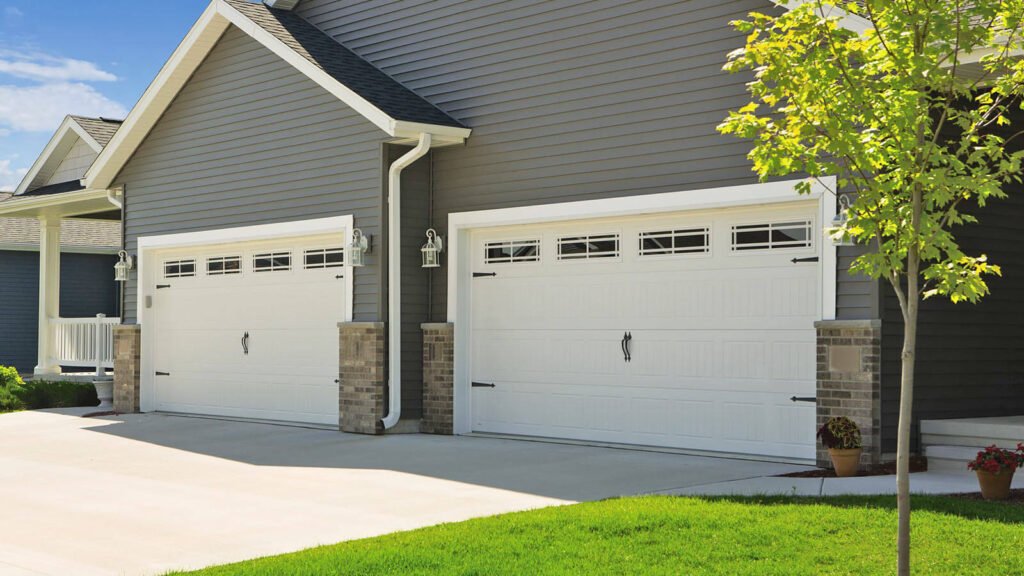
Residential garage doors are built to last, but like any mechanical system, they can experience issues over time. From minor inconveniences to major breakdowns, knowing how to identify and troubleshoot common garage door problems can save you time and money. Here are some of the most frequent issues homeowners face with their residential garage doors and how to fix them—or when to call a professional.
1. The Garage Door Won’t Open or Close
One of the most frustrating problems is when your garage door refuses to open or close. Several factors could be at play here:
- Dead Remote Batteries: If your remote isn’t working, the batteries may need to be replaced. Always check this first.
- Disconnected Opener: If the motor runs but the door doesn’t move, the opener might be disconnected from the door. You can often fix this by re-engaging the opener’s release mechanism.
- Broken Springs: If the springs are broken, the door won’t be able to lift or lower properly. Broken springs require professional repair, as they’re under a lot of tension and can be dangerous to handle.
2. The Door Makes Loud Noises
A noisy garage door is more than just annoying—it’s often a sign that something is wrong. Common causes of noisy operation include:
- Worn-Out Rollers or Hinges: If your rollers or hinges are old or rusty, they may need to be replaced.
- Lack of Lubrication: Squeaking or grinding sounds can usually be resolved with a good dose of lubricant applied to the moving parts.
- Loose Parts: Check for any loose nuts, bolts, or screws, and tighten them as needed to reduce rattling noises.
3. The Garage Door Moves Unevenly
If your garage door appears to open or close unevenly, it could be due to:
- Misaligned Tracks: The tracks might be bent or out of alignment, causing the door to shift as it moves. This can often be fixed by gently adjusting the tracks back into place.
- Worn Cables or Rollers: If the cables or rollers are worn, they may need to be replaced to ensure smooth and even operation.
4. The Garage Door Reverses Before Closing
This issue is typically related to the door’s safety sensors. If the sensors are blocked, misaligned, or dirty, they will signal the door to reverse to avoid closing on an object. Here’s how to fix it:
- Clean the Sensors: Wipe away any dirt or debris from the sensor lenses.
- Check the Alignment: Make sure the sensors are aligned correctly and that the LED lights are on. If one sensor is blinking, it’s misaligned.
5. The Garage Door Opens Slowly
If your garage door is operating slowly, it could be due to:
- Old Springs or Motor: Over time, springs can lose tension, and motors can become sluggish. These parts may need to be replaced or upgraded.
- Poor Lubrication: Insufficient lubrication can cause the door’s movement to slow down. Apply lubricant to the rollers, springs, and hinges to restore smooth operation.
Conclusion for Residential Garage Doors
Understanding common residential garage door problems and knowing how to fix them can save you time, money, and frustration. Whether it’s a noisy door, a slow opener, or misaligned tracks, many issues have simple solutions. However, for more complex problems like broken springs or motors, it’s best to call a professional. At Open Sesame Garage Doors Summerlin, we offer expert repair services to keep your garage door running smoothly.
FAQs for Residential Garage Doors
Why won’t my garage door open or close? It could be due to dead remote batteries, a disconnected opener, or broken springs. Check the batteries first and contact a professional if needed.
What’s causing my garage door to make loud noises? Noisy operation is often caused by worn-out rollers, lack of lubrication, or loose hardware.
How do I fix an uneven garage door? Misaligned tracks or worn cables can cause uneven movement. You may need to adjust the tracks or replace worn components.
Why does my garage door reverse before closing? This is likely due to misaligned or dirty safety sensors. Clean the sensors and ensure they are properly aligned.
What should I do if my garage door is moving slowly? Old springs, a sluggish motor, or poor lubrication can cause slow movement. Lubricate the moving parts or consider upgrading the opener.

